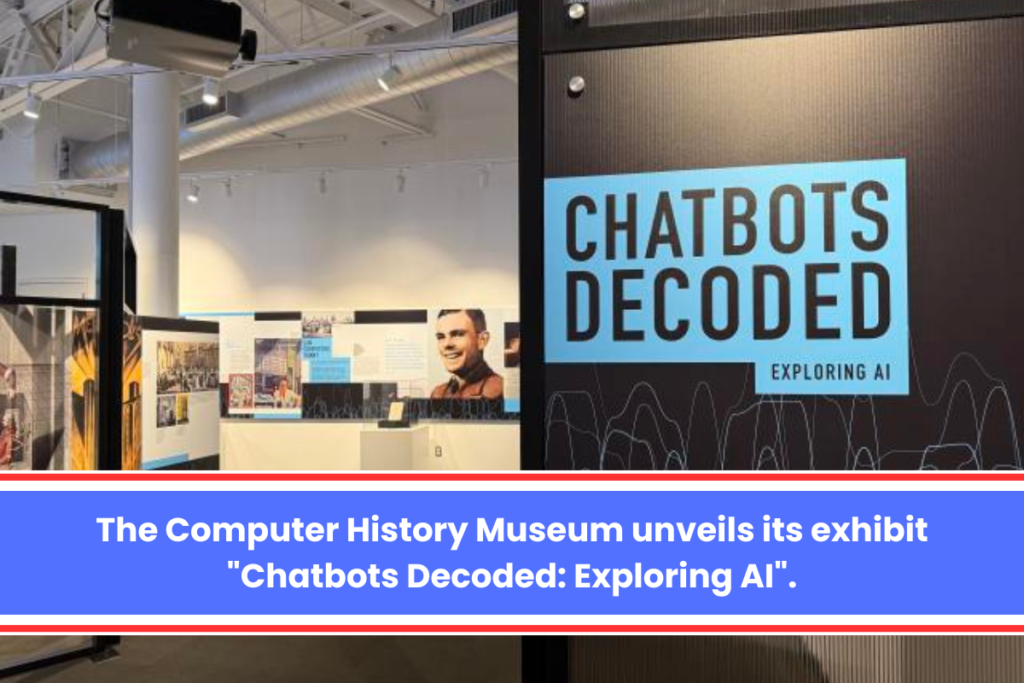On November 20, 2024, in Mountain View, California (Sputnik) — “Chatbots Decoded: Exploring AI” is the name of the new show at the Computer History Museum (CHM), which is the best place to learn about technology’s past, present, and future effects on people.
This cutting-edge, immersive experience tells visitors about the past, present state, and possible futures of chatbots and AI, giving them a look into what could be one of the most important technologies of our time.
The 2,000-square-foot exhibit shows how chatbots have changed over time, from their early days with Alan Turing and other innovators to the rise of current AI-powered platforms like ChatGPT.
For people in high school and up, “Chatbots Decoded” is a lively and interesting look at how AI is changing work, school, and society. It asks important questions about ethics, trust, and how people can connect with smart machines.
Some important things about the show are:
- Interactive experiences: Talk to past chatbots like ELIZA and A.L.I.C.E., as well as AMECA, a cutting-edge humanoid robot by Engineered Arts that can talk to people in many languages using advanced AI technology.
- Explore more than 30 objects that show how conversational AI technology has changed over time. These include rare early AI machines, talking toys, and a prototype of the first Amazon Echo.
- Immersive Video: Wall-sized projections take you on a trip through a fascination that has been around for a long time with machines that talk.
- Polling and feedback stations: People can share their thoughts on AI’s future and effects by taking part in live, interactive polls.
- Kirsten Tashev, Chief Curatorial and Exhibitions Officer at CHM, said, “We wanted to make a fully immersive and interactive exhibit that not only shows how chatbots have changed over time but also gets people to think deeply about AI’s growing role in our lives.
- ” “From exploring early breakthroughs to engaging with cutting-edge technology, this exhibit brings the complex world of AI to life in a way that is accessible, entertaining, thought-provoking, and beautiful.”
The exhibit shows CHM’s goal to understand technology by linking the history of computers to their present and future effects on people.
“Chatbots Decoded” is a great example of CHM’s dedication to giving guests the tools they need to use AI technologies in a thoughtful and critical way. “Chatbots are at the top of the tech news right now,” said Dan’l Lewin, President and CEO of CHM.
“Not only does this exhibit give historical background, but it also lets our visitors think about what these technologies mean and how they might affect the world.”
AI pioneers, technologists, and thought leaders, such as Reid Hoffman (co-founder of OpenAI), Adam Cheyer (co-creator of Siri), Lauren Kunze (founder of Pandorabots), and Fei-Fei Li (AI expert), have shared their ideas and thoughts in this exhibit.
Through a partnership with Engineered Arts, CHM also brings AMECA, a high-tech humanoid robot, to the show, making it an interactive experience like no other.
Important companies like Amazon, GitHub, Microsoft, Khan Academy, and Google contributed objects and images. CHM also worked with 3Blue1Brown on an animation that explained big language models, which made complicated AI ideas easy for everyone to understand.
The show is at 1401 N. Shoreline Blvd., Mountain View, CA, and here is some information for visitors. The CHM is open from 10 a.m. to 5 p.m., Wednesday through Sunday.
General entry costs $19.50, but seniors, students, and kids can get in for less. In the coming year, there will be more online content and events connected to the exhibit.
About CHM
The Computer History Museum (CHM) is all about breaking down technology, including its history in computers, its use today, and its effects on people in the future.
Because it is in Silicon Valley, the Museum is in a great situation to learn from the past and use our research, exhibits, events, and unique collection of computing artifacts to make digital citizens who are well-informed and able to make decisions that will lead to a better future.


